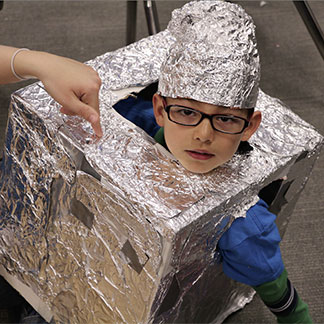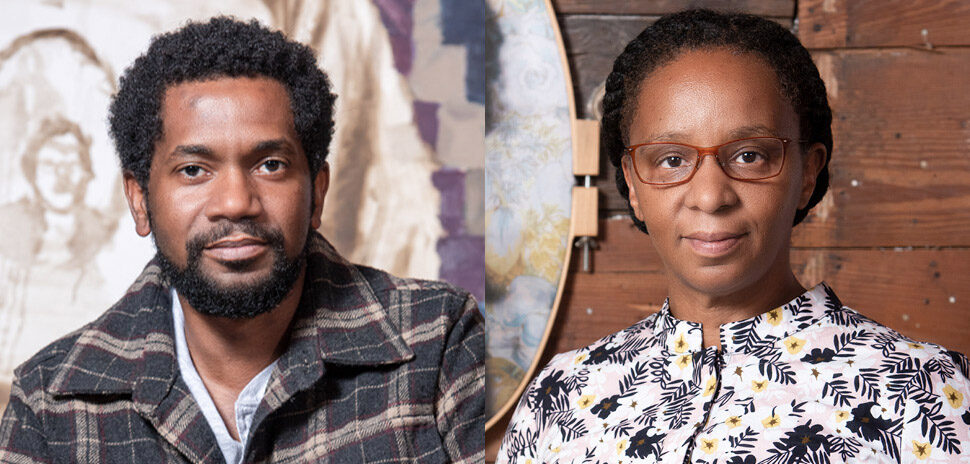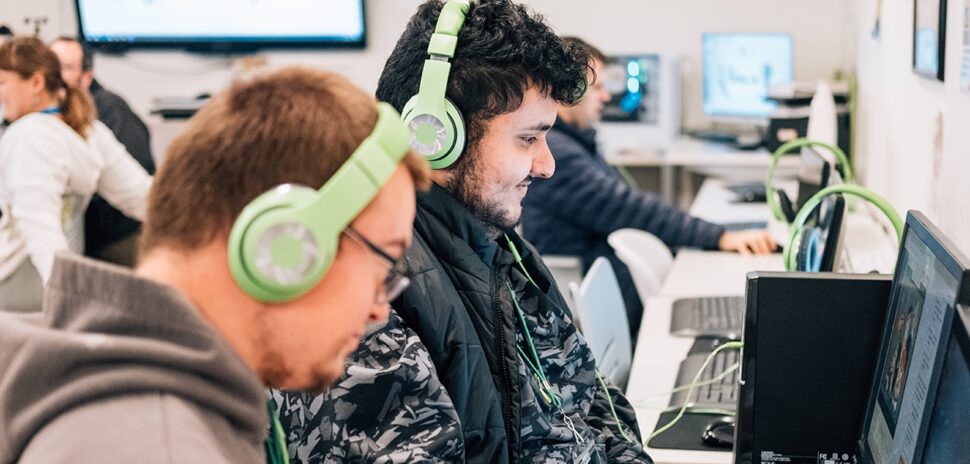You walk into a room. On the table are some paper, rubber bands, cups, paper clips, mailing labels, two ping pong balls, and a spoon. Your task: Build a device that can transport the ping pong balls from one square (taped off on the floor) to another (a few feet away).
This might hurt your brain to think about, but the school-aged kids who participate in Destination Imagination are ready for the challenge. They’ve never seen these materials before, but they’ve been working as a creative, problem-solving team for months now. Some of them might construct a slingshot-style device to launch the balls from box to box. Others might make a paper tunnel to guide the balls. Some will create a sled-like contraption and blow the ball to its destination.
This is an example of an Instant Challenge, one of the components of a nonprofit, project-based program called Destination Imagination. DI was incorporated in 1982, has chapters across the world, and engages students from preschool age to the university level. The idea is to stimulate the next generation of innovators and critical thinkers — and it seems to be working. According to a study of 600 students conducted in 2011, 70 percent of kids who participate in Destination Imagination feel they perform better in school. According to a study completed in 2014, Destination Imagination students are more inquisitive, collaborative, and creative, and have higher levels of self-confidence.

Photo courtesy Destination Imagination.
“It’s a celebration of creativity that prepares kids for twenty-first-century jobs and skills,” Dallas co-regional director Sherri Cook says. “It’s creative thinking paired with collaboration and teamwork.”
Each year, DI offers seven new project-based challenges (challenge categories include technical, scientific, fine arts, improvisational, structural, service learning, and rising stars — for the younger kids). Students form teams of up to seven — sometimes DI is part of an afterschool program; sometimes it works in conjunction with school curriculum — and choose a challenge. They spend several weeks to several months working on solutions to these open-ended challenges. The students then have the opportunity to present their solutions at a tournament.
“The challenges are all different, but they all ask kids to use the same skills,” Cook says. “Kids will pick a challenge that suits their particular talents as a whole — they go with the strength of their team.”
The challenges can include tasks like creating a musical instrument or writing and performing a short skit. This year, the technical challenge asks kids to build a vehicle that can carry a person across the presentation site. The service learning challenge calls for teams to come up with a project that helps with a community need and create a meme to help meet their goal. Students work with an adult mentor (DI is volunteer-based) who helps keep them on track, but is never allowed to solve their challenge for them. The program runs from September through May. Teams that score the highest on their presentations at the regional tournament advance to the state tournament, and then on to the Global Finals. Part of their scoring is based on how well they perform in an Instant Challenge, an up to eight-minute challenge like the one with the ping pong balls, intended to measure how well kids think on their feet.
“Destination Imagination is something that all kids can do, whether they’re in public school, private school, gifted, or not,” says Cook, whose daughter went to the Global Finals as a sixth grader. “It’s life-altering.”
The Dallas chapter (which encompasses Dallas ISD, Duncanville ISD, Cedar Hill ISD, Lancaster ISD, and all private schools and home schools within those boundaries, with the exception of Highland Park ISD, which is actually part of the Dal-Rich DI program) is growing fast. Currently, there are 190 teams registered to compete. This year’s Dallas regional tournament will be held February 20th, at Bryan Adams High School.
“Destination Imagination is something that all kids can do, whether they’re in public school, private school, gifted, or not,” says Cook, whose daughter went to the Global Finals as a sixth grader. “It’s life-altering.”
For more information on volunteering or starting a Dallas DI team, visit the website or email [email protected].
For a daily dose of what’s new, now, and next in Dallas-Fort Worth innovation, subscribe to our Dallas Innovates e-newsletter.






























